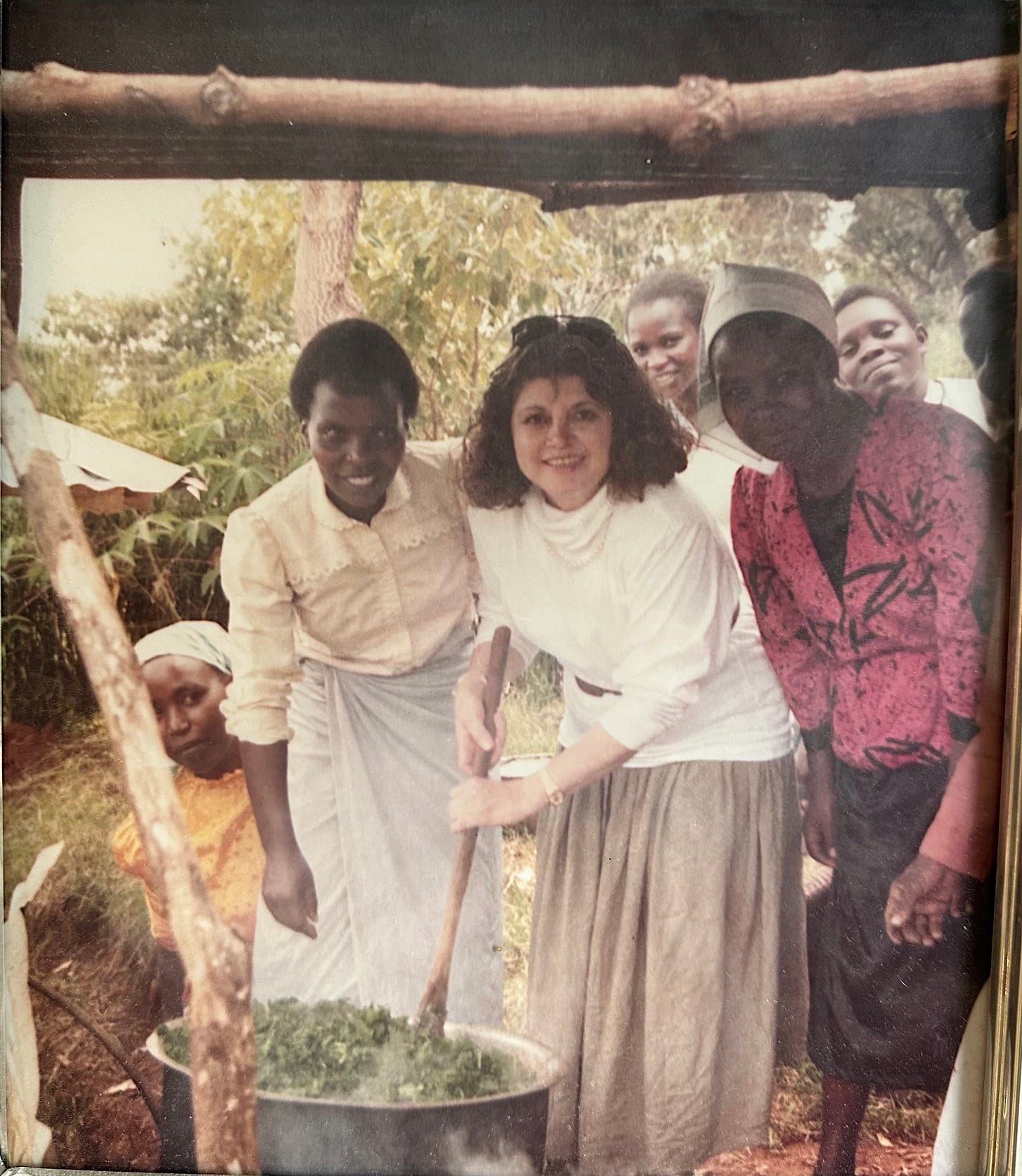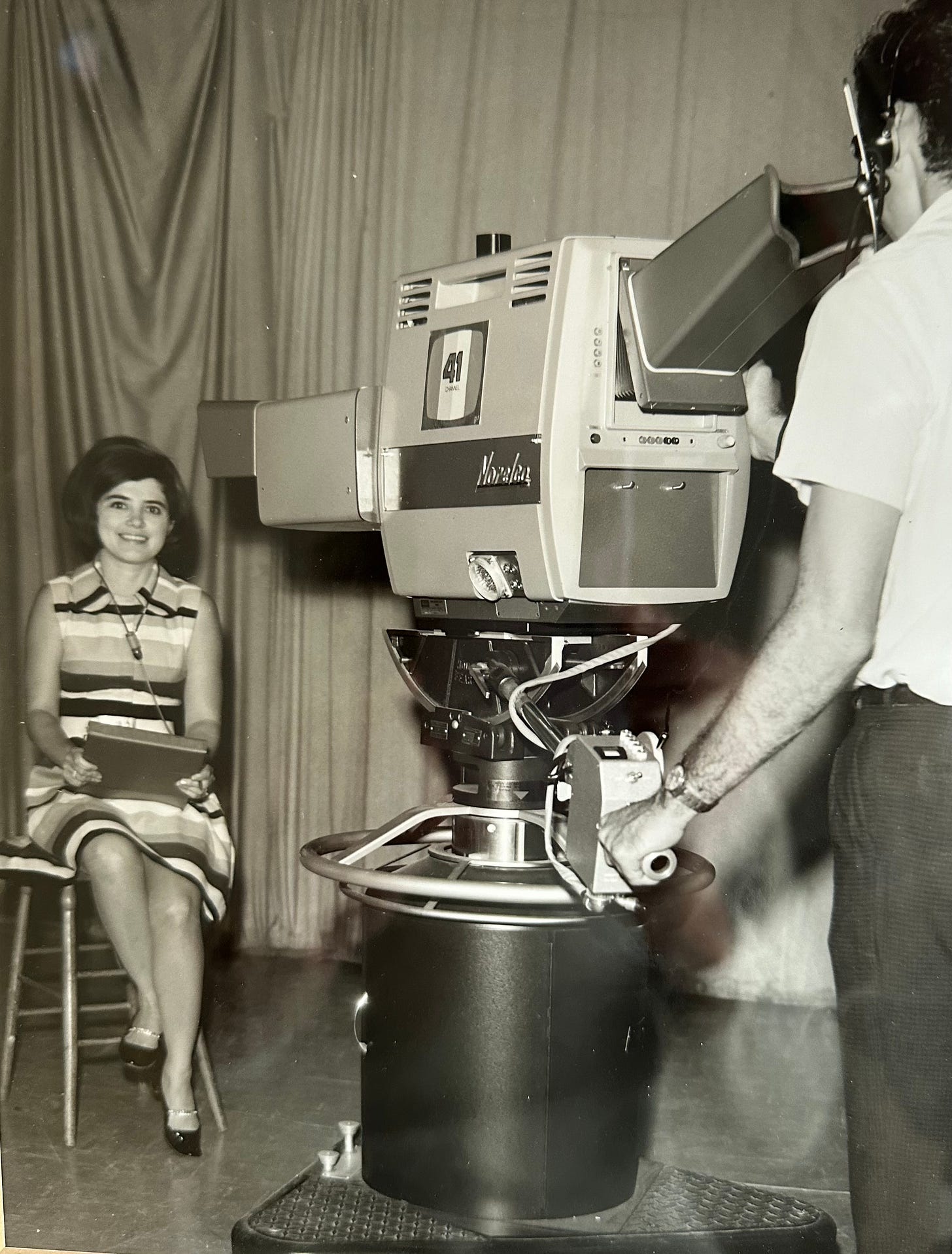In Her Words: Olga Brown, 82, On Lifelong Learning & Living With Purpose
Could staying mentally and physically active and embracing the philosophy that things happen for the best be the secret to a long, youthful, vibrant life? Olga makes it look that way!
I am Mexican-American. I grew up in the Rio Grande Valley of Texas, an hour outside the border cities of Reynosa-McAllen. I am the oldest child of five and I had lovely parents who thought that there wasn’t anything I couldn't do. They always said, “You’re the best. You can do it.” It was wonderful to grow up with parents like that. When I was in grade school and junior high, my father had a ranch, and he would work all day, and then at night, he would drive my sister and me to the 4-H Club. I did very well in public speaking and in leadership. I think one of the things that my parents taught me was to be competitive. Whenever I did anything, I tried to win. If I didn't win whatever the prize was, I would say, “Well, next time.”

I’m 82. In February, I’ll be 83. I’ve been practicing law for 44 years, full-time. On top of that, I play tennis, I collect art, and I started a neighborhood book club. Alamo Heights, my San Antonio neighborhood, is kind of like a small little village and I kind of stand out because of my background. My yard has palm trees, and my flowers are reminiscent of the valley. The neighbors always stop and ask me about my garden. They want to talk. After a while, I say, “Okay, guys, what else? You want to come in and have a glass of champagne?” And usually they say, “No, not right now. We want to finish our walk or our run.” And, of course, with book club, we always have something to drink. I ask my friends not to bring food, because then you have to worry about returning dishes and all of that. It’s just as easy for me to cook and get it done. But I will say, “If you want to bring a bottle of champagne or bubbly, that’s fine.” Now I have a collection that I need to get rid of. So if you come and visit, the champagne is cold and that’s the first thing I’m going to ask you.
In my book club, we recently read The Unfinished Love Story: A Personal History of the 1960s by Doris Kearns and the book goes into discussion of the war on poverty. I actually had the opportunity to be a war on poverty warrior and it gives me chills to say that. When the war on poverty came to San Antonio under President Lyndon B. Johnson, I had an opportunity to have a live television program through the through the OEO (Office of Economic Opportunity). I would have speakers on the show from the different poverty programs, like Foster Grandparents and Legal Aid, so the public could be made aware of the programs and be able to take advantage of them. It was really fun and it’s one of the things that I'm the proudest of in my life.



The program was in Spanish and even though they had the latest technology, they pointed the finger at you, and you were on the air. That experience trained me to think on my feet. One day I showed up and I was asked to discuss the drama program for school children and their performance of Cinderella. The camera men were ready, and I said in Spanish, “Good afternoon, everybody. Today, we're having a show on a “cenicero,” which is an ashtray, instead of saying "Cenicienta," which is Cinderella. You should have seen the camera men! The television station owner came running down and I said, “Are you going to fire me after my program?” He said, “No, but I want you to take Spanish lessons.”
Things always happen for the best in life, even though at the time you might not realize it. After my experience at the Spanish news program, an English speaking station asked me to audition for their regular TV programming. I said, “Sure, I'll come.” I was really confident. I auditioned and they called me later and said, “We'll hire you.” I said, “Well, how much are you going to pay me?” They said, “$200 a week.” That was before newscasters made all the money that they make now. I went home and told my husband (now my ex-husband) and the father of my two daughters. “Guess what? They want to hire me and they’re going to pay me $200 a week” I was so excited, and he said, “I’ll pay you that to stay home.” He was a very prominent criminal defense lawyer, and I guess he didn’t want me to outshine him or be out there where he was. So I said, “Okay, I’ll stay home.”
It turned out that my husband was having affairs all over town. That was a very challenging time for me. I said to myself, “If he can be a lawyer, I can be a lawyer.” I went through law school in 27 months with no breaks because I was afraid that if I quit for the summer, I might not get back into it again. As soon as I got my degree, I got a divorce, and it was amicable. Even though there was fault in the marriage, we were and still are friends. But then again, my philosophy is that things always happen for the best. I wouldn’t have been a lawyer if I had not had that real downfall.
When I was first starting out forty years ago, no one was going to hire me for their product liability case or business case, but in a way, I found that to be really good too. Women came to consult with me for divorce and family law cases. They would be really scared, and I would share my life story with them. “Look, I believe things happen for the best. I am a lawyer who can help you, and I can relate to you because I was scared and worried about raising two little girls on my own when they had been exposed to a privileged upbringing,” I would tell them. “I was really scared but look at me now.”

I think that my clients felt encouraged. I still feel that way, although now I’m doing more business litigation and more personal injury litigation these days. My clients now are usually engaged in business and in their early 30s, 40s and 50s, although I also have some clients who are seniors. Last week a young person came to see me to ask me for help drafting a power of attorney. I asked, “How’d you get to my office?” and they said, “You helped my grandfather, and he told me to come to you.”

I have a picture of me with Justice Ketanji Brown Jackson, because her daughter and my granddaughter were classmates in high school. I had a trial coming up on the day of high school graduation and Ketanji was one of the speakers. I said to the lawyer on the other side, “Can we reset this? I’m going to meet the new nominee for Justice of the Supreme Court.” And he said, "Yeah, right.” When I got there, I approached her. She hadn’t been sworn in yet, but she was still covered with security. I said, “Justice, I would like to have a picture with you because you’re my excuse for not having a jury trial this week.” She smiled. She put her arm around me, and I got the picture. She has something about her personality that kind of draws you in. I sent the picture of Ketanji and me labeled “my new best friend,” to the other attorney and to my tennis group. My tennis group’s reaction was “Does she play tennis?”

People ask me, “When are you going to retire?” and I say, “Never. I’m never going to retire. I’m going to work as long as I can. At one point, I thought that I could write the all-American novel based on people that I knew. But it’s easier to practice law than to write a best seller.
If you were to go back in time, what would you tell your 25 year old self?
Be optimistic about the future because no matter what problems or missteps or setbacks you’ve had in the past, it was for some reason that’ll make you better. You have a setback, you work through it, you’re going to be better for it.
Belle Curve Stories is about women navigating life with grit, grace, and growth. What do those three words mean to you?
When I first started practicing law, and even today, you know, the male litigants come at you like “Oh, you’re a woman.” You have to have grit to stand up and do what you have to do. In my case, I had to stand up and practice law. It was even harder back then, in the 80s and 90s, because even the judges would kind of put you down. I remember one time I had this case with this judge, and he would say, “Speak louder. Counselors, speak louder.” I would come home and I would yell at my daughters, “What do you want for dinner?” They would respond, “Mom, Mom, calm down.” I think that grit means standing up for yourself and your beliefs and in your mission.
I don’t know if I have grace or not, but to have grace comes with age. As you get older, you become more empathetic. In my younger days, if I saw a homeless person, I’d say, “Oh, he’s just a drug addict.” As you get older, you love people more. My office is three blocks from the courthouse, and between my office and the courthouse, there are a lot of street people. So usually on Thursdays, I go to the bank and I get $50 or $100 in fives and tens and along the way, I hand them out like I’m the Easter Bunny. I don’t care if they’re just gonna buy a pack of cigarettes or a beer or a taco. I want to be a person who will look them in the eyes, smile at them and say, “Good morning. This is for you.”
I think that there’s always growth, because you’ve had life experiences. You definitely grow in all aspects: intellectually, socially, and financially. You also see other people experiencing other things. I firmly believe that you have to learn something new every day.
You grow new brain cells until the day you die. I believe you’re growing them faster if you learn new things. That’s my theory as a non-medical person. I try to learn something new, then I broadcast it to my friends. When I run into a new issue in law, I tell my friends, “I’m going to make myself an expert on that.” Because when you grow mentally, that makes you physically healthy. That’s how I feel. That’s how I live my life.
As told to and edited by Teresa Bellock and Sandra Ditore.
Olga Brown, age 82, and her husband Gene, reside in the Alamo Heights neighborhood of San Antonio, Texas. Olga has been a practicing attorney for 44 years and has no plans to retire. In addition to her law career, she enjoys an active lifestyle, which includes playing tennis regularly, leading a neighborhood book club, and traveling to visit her adult daughters and their families.





Amazing story ❤️